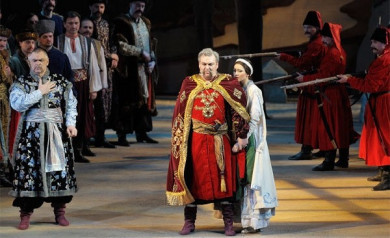Tchaikovsky’s "Mazepa" is a thrilling and captivating tale. The libretto of the opera is based on an epic poem by Pushkin.
The music matches the story in terms of drama.
There are plenty of loud and flamboyantly exciting moments, it's a musical rollercoaster journey with just the right balance of gusto and sensitivity.
The cast of soloists is excellent. The beautiful costumes are a joy to observe and the lavish stage production is truly a visual feast.
1950 Production
Synopsis
The action is set in the Ukraine in the early 18th century.
Act I
Scene 1
Kochubei’s house and garden.
The girls come to Maria, Kochubei’s daughter, and tell her to come and have her beloved’s fortune told. She refuses: her father has a guest, the hetman Mazepa. Her heart if filled with deep love for him.
A childhood friend, Andrei the Cossack, knowing of Maria’s fateful passion, declares his unrequited love for her and begs her to leave Mazepa. Maria, understanding the full recklessness of her feelings, nonetheless is powerless to resist them. Kochubei enters the garden, with his wife Lyubov, Mazepa and his other guests.
Kochubei’s servants amuse Mazepa with singing and dancing.
Mazepa asks Kochubei for Maria’s hand. Kochubei and Lyubov are enraged at the old hetman’s proposal – he is Maria’s godfather. The hetman turns to Maria and offers her a choice between him and her parents. She, after tortuous hesitation, gives her hand to Mazepa. The hetman carries Maria away.
Scene 2
A room in Kochubei’s house.
Maria’s mother mourns the loss of her daughter, who has now left her father’s home. She urges her husband to take revenge on Mazepa. Kochubei proposes his plan of vengeance: he has found out about the links between the hetman and Sweden’s King Charles XII, and of Mazepa’s proposed betrayal of Peter I, and he resolves to present the captured hetman to the Russian Emperor.
Andrei is ready to deliver a denunciation before the Emperor. Kochubei’s acquaintances are filled with hatred for the hetman Mazepa.
Act II
Scene 3
A cellar in Mazepa’s palace in Belotserkovsk.
The mendacious hetman, having been warned of his denunciation before Peter I, has succeeded in slandering Kochubei to the Emperor. Bound in chains and having been tortured, both Iskra and Kochubei await interrogation.
Orlik enters – he is the hetman’s faithful retainer. He demands that Kochubei give up the treasure he allegedly has buried in the village of Dikanka.
Kochubei has nothing: his honour has been despoiled by Mazepa, and his beloved daughter Maria taken from him by the very same Mazepa.
Kochubei desires one thing only – revenge.
Scene 4
A room in Mazepa’s palace.
The hetman is receiving in secret the ambassadors of the Swedish King. Orlik enters, and receives the order to execute Kochubei.
Maria appears. In a talk with Mazepa, she upbraids him for his coldness towards her. Jealous suspicions torment her soul. Unwillingly, the hetman must lay bare before his daughter the true reason for his coldness, and he reveals the secret plan against the Russian Tsar. Mazepa wants to know whom Maria would choose: her father or her husband, if she was forced to make that choice? In disarray, she speaks of the boundless nature of her love, she does not understand the question of a choice between father and husband. Mazepa leaves.
Maria’s mother appears, having secretly gained access to the palace; she tells her daughter of the failed plot against the hetman, and is stunned that her daughter does not know about the death that awaits her father. Maria and Lyubov hurry to stop the execution.
Scene 5
The road leading to Kochubei’s place of execution.
The people await the appearance of the sentenced men, while a drunken Cossack sings and dances in the crowd. The executioner appears, followed by Mazepa and Orlik, then Kochubei and his friend Iskra are brought in. The sentenced men bid farewell to one another, the people and life, and they mount the scaffold.
Maria and Lyubov run in. But they are too late. The sentence has been executed.
Act III
Scene 6
The Battle of Poltava – symphonic scene.
Scene 7
Kochubei’s former home and garden.
The height of the battle, Russian warriors and pursuing the Swedes; Andre is among them. He is stopped by familiar places, and he recalls times of happiness gone by. Mazepa appears with Orlik. They have fled after the loss of the Swedes at Poltava. Andrei, recognising Mazepa, attacks him with a sword, but Mazepa forestalls him and wounds him fatally.
Maria appears, having lost her mind; she recognises nothing around her. Drowning in grief, the daughter laments her murdered father.
Orlik and Mazepa hide. Not recognising the dying Andrei, Maria lulls him with a cradle song.
 Mariinsky Theatre:
Mariinsky Theatre:  Mariinsky-2 (New Theatre):
Mariinsky-2 (New Theatre):  Mariinsky Concert Hall:
Mariinsky Concert Hall: 

